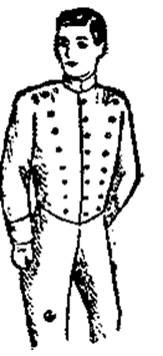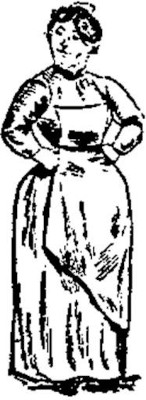This article has been transcribed from a copy of the Cardiff Times in the online collection of scanned Welsh newspapers 1804-1919 in the National Library of Wales, with grateful recognition of the free access accorded to all readers. Paragraph breaks have been introduced for easier reading.
Notes
The newspaper's target readers are unlikely to have a complement of live-in servants, and the material in the three nostalgic, opening paragraphs is almost certainly outside their experience, and refers to a literary stereotype rather than to historical reality. The answer to the rhetorical question, 'Who does not know the old family butler' is that readers know the character from stage and fiction. The 'olde worlde' caption to the second illustrations may be the editor's indication that much of the subject-matter is known to the readership in this way and not from life.
Our Boys was a comedy in three acts written by Henry James Byron, and first performed in 1875 at the Vaudeville Theatre in London. Until it was surpassed by the run of Charley's Auntin the 1890s, it was the world's longest-running play, with 1,362 performances up to April 1879. Belinda is a lodging-house slavey (servant) whose actions bring about the play’s resolution.
The periodicals mentioned carried fiction aimed at a newly literate public: The Family Herald: A Domestic Magazine of Useful Information & Amusement (1843–1940); The Princess Novelettes (1886); The Young Lady's Journal (1889-1929) an official publication of The Church of Jesus Christ of Latter-day Saints for the Young Ladies' Mutual Improvement Association. —— David Skilton

eople who come in contact with the domestic servant of to-day cannot but ruminate on the difference between these and the servants of the past. They are two distinct classes, and the older generation of hired men and women had very different ideas and opinions to the servants of to-day.
One seldom hears now-a-days of a servant who has, as it were, lived and died in the service of a family. Yet the annals of old houses are filled with such records. The old serving men and women lived almost for the family they served, and they looked upon the fortunes of the house with as much interest as though they were their own. With pride did the old nurse tell of the many years she had been in a family and how from one generation to another she had watched and guarded its off- spring.

From the Upper Circles
Who does not know the old family butler, the tried and trusted — and not unfrequently – bullied, servant of an old lord with more ancestral name than ancestral money. This old servant has stuck to the old family in spite of reverses, he has helped to tide over many a rock-a-head, and has used much diplomacy in the matter of the local and district tradesmen. He has not always received his salary, yet he has stayed on through good and ill, a faithful servant, and, almost a friend of the family.
Now-a-days all this is altered, and the people who have to engage servants are bemoaning their fates to no small extent. Any lady who can keep a servant a year or eighteen months is considered by her friends to be exceptionally lucky. It is usual for a mistress to keep her servants for six months and to be a considerable time before she can replace them.
Good servants are very bad [hard?] to get, and in middle-class families they are more bother than the domestic cat. They are like angels' visits few and far between.

Ye Boy in Buttons
The decline of the ordinary slavey is largely due to the clothing factories, where girls can earn decent wages with a large percentage of freedom unknown to the domestic servant, who is tied to the house several nights a week, and only get[s] one Sunday out in a fortnight.
There is no doubt that mistresses have much to complain of, yet on the other hand, the servants have much to complain of in relation to their masters and mistresses.

Old Style Butler
As servants are good, bad, and indifferent. so, also, are their employers; and many a poor girl, employed as maid of all work in a middle class family, is little less than a domestic slave. She has to do all sorts of work and to put up with unlimited bullying and snubbing. If anything goes wrong with the domestic machinery it is put down to the unfortunate slavey, who is made responsible for diminished eatables, broken crockery ware, and the milk, in reality purloined by the cat.
She is kept up late and expected to be up early in the morning. Her prototype is to be found on the stage in Our Boys, the Belinda of which is a fair specimen of her class. But of late years there has risen on the domestic horizon a new star in the shape of the educated slavey, a being with ideas as to refinement and accomplishments.
She has early found a place in the comic papers, where she is depicted as requiring time for music and the fine arts. She is big on nights out, and has comprehensive notions as to perquisites and followers. This young damsel is in her element when the family is away from home, and considers it her duty to air the dresses of her mistress and to keep the rooms from getting damp by inviting her friends and admirers to a series of At Homes and evening parties. She has large notions as to her rights in her own domain — the kitchen, and gets most indignant if her employer ventures to visit too often the regions below stairs. She is big on fiction, and glories in The Family Herald, The Princess Novelette, and The Young Lady's Journal. She is very much up to date in the matter of her frocks, and not unfrequently turns out in more stylish fashion than her mistress. She does no more work than she can help, and considers herself designed more for ornament than use. Where there are sons in the family she is not averse to a flirtation, and has been known to try her hand in the same direction with the lord and master of the establishment.

From the Lower Ranks
Servants generally are fond of a change which may help to elucidate the mystery of their limited engagements.
They are a necessary evil, and, to judge from the general complaints as to their shortcoming they are more evil than necessary. Certain it is that they cause a lot of bother in houses and take a tremendous lot of looking after.
If they are not blessed with one failing they are with another, and the old American lady spoke truly when she said, 'If it isn't one thing, it's the other.'
A perfect servant would be a paragon, and the master or mistress who possessed her might reasonably consider herself one of the chosen few.
Links to Related Material on Servants
- Samuel on Domestic Servants
- Fun on Servants and the Sermon Problem
- Punch on Servants Copying Employer’s Clothing
Last modified 25 April 2022